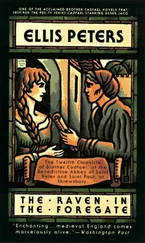“That was bold,” said Hugh with raised brows. “How did his lordship counter it? Was he put out of countenance?”
“I think he was shaken, but not disastrously, not then. He made a long speech-it is a way of keeping others silent, at least for a time-reproving the city for taking into its membership men who had abandoned their king in war, after leading him astray by their evil advice, so grossly that he forsook God and right, and was brought to the judgement of defeat and captivity, from which the prayers of those same false friends could not now reprieve him. These men do but flatter and favour you now, he said, for their own advantage.”
“If he meant the Flemings who ran from Lincoln,” Hugh allowed, “he told no more than truth there. But for what other end is the city ever flattered and wooed? What then? Had they the hardihood to stand their ground against him?”
“They were in some disarray as to what they should reply, and went apart to confer. And while there was quiet, a man suddenly stepped forward from among the clerks, and held out a parchment to Bishop Henry, asking him to read it aloud, so confidently that I wonder still he did not at once comply. Instead, he opened and began to read it in silence, and in a moment more he was thundering in a great rage that the thing was an insult to the reverend company present, its matter disgraceful, its witnesses attainted enemies of Holy Church, and not a word of it would he read aloud to us in so sacred a place as his chapter house. “Whereupon,” said the abbot grimly, “the clerk snatched it back from him, and himself read it aloud in a great voice, riding above the bishop when he tried to silence him. It was a plea from Stephen’s queen to all present, and to the legate in especial, own brother to the king, to return to fealty and restore the king to his own again from the base captivity into which traitors had betrayed him. And I, said the brave man who read, am a clerk in the service of Queen Matilda, and if any ask my name, it is Christian, and true Christian I am as any here, and true to my salt.”
“Brave, indeed!” said Hugh, and whistled softly. “But I doubt it did him little good.”
“The legate replied to him in a tirade, much as he had spoken already to us the day before, but in a great passion, and so intimidated the men from London that they drew in their horns, and grudgingly agreed to report the council’s election to their citizens, and support it as best they could. As for the man Christian, who had so angered Bishop Henry, he was attacked that same evening in the street, as he set out to return to the queen empty-handed. Four or five ruffians set on him in the dark, no one knows who, for they fled when one of the empress’s knights and his men came to the rescue and beat them off, crying shame to use murder as argument in any cause, and against an honest man who had done his part fearlessly in the open. The clerk got no worse than a few bruises. It was the knight who got the knife between his ribs from behind and into the heart. He died in the gutter of a Winchester street. A shame to us all, who claim to be making peace and bringing enemies into amity.”
By the shadowed anger of his face it had gone deep with him, the single wanton act that denied all pretences of good will and justice and conciliation. To strike at a man for being honestly of the opposite persuasion, and then to strike again at the fair-minded and chivalrous who sought to prevent the outrage-very ill omens, these, for the future of the legate’s peace.
“And no man taken for the killing?” demanded Hugh, frowning.
“No. They fled in the dark. If any creature knows name or hiding-place, he has spoken no word. Death is so common a matter now, even by stealth and treachery in the darkness, this will be forgotten with the rest. And the next day our council closed with sentence of excommunication against a great number of Stephen’s men, and the legate pronounced all men blessed who would bless the empress, and accursed those who cursed her. And so dismissed us,” said Radulfus. “But that we monastics were not dismissed, but kept to attend on him some weeks longer.”
“And the empress?”
“Withdrew to Oxford, while these long negotiations with the city of London went on, how and when she should be admitted within the gates, on what terms, what numbers she might bring in with her to Westminster. On all which points they have wrangled every step of the way. But in nine or ten days now she will be installed there, and soon thereafter crowned.” He lifted a long, muscular hand, and again let it fall into the lap of his habit. “So, at least, it seems. What more can I tell you of her?”
“I meant, rather,” said Hugh, “how is she bearing this slow recognition? How is she dealing with her newly converted barons? And how do they rub, one with another? It’s no easy matter to hold together the old and the new liegemen, and keep them from each other’s throats. A manor in dispute here and there, a few fields taken from one and given to another… I think you know the way of it, Father, as well as I.”
“I would not say she is a wise woman,” said Radulfus carefully. “She is all too well aware how many swore allegiance to her at her father’s order, and then swung to King Stephen, and now as nimbly skip back to her because she is in the ascendant. I can well understand she might take pleasure in pricking into the quick where she can, among these. It is not wise, but it is human. But that she should become lofty and cold to those who never wavered-for there are some,” said the abbot with respectful wonder, “who have been faithful throughout at their own great loss, and will not waver even now, whatever she may do. Great folly and great injustice to use them so highhandedly, who have been her right hand and her left all this while.”
You comfort me, thought Hugh, watching the lean, quiet face intently. The woman is out of her wits if she flouts even the like of Robert of Gloucester, now she feels herself so near the throne.
“She has greatly offended the bishop-legate,” said the abbot, “by refusing to allow Stephen’s son to receive the rights and titles of his father’s honours of Boulogne and Mortain, now that his father is a prisoner. It would have been only justice. But no, she would not suffer it. Bishop Henry quit her court for some while, it took her considerable pains to lure him back again.”
Better and better, thought Hugh, assessing his position with care. If she is stubborn enough to drive away even Henry, she can undo everything he and others do for her. Put the crown in her hands and she may, not so much drop it, as hurl it at someone against whom she has a score to settle. He set himself to extract every detail of her subsequent behaviour, and was cautiously encouraged. She had taken land from some who held it and given it to others. She had received her naturally bashful new adherents with arrogance, and reminded them ominously of their past hostility. Some she had even repulsed with anger, recalling old injuries. Candidates for a disputed crown should be more accommodatingly forgetful. Let her alone, and pray! She, if anyone, could bring about her own ruin.
At the end of a long hour he rose to take his leave, with a very fair picture in his mind of the possibilities he had to face. Even empresses may learn, and she might yet inveigle herself safely into Westminster and assume the crown. It would not do to underestimate William of Normandy’s grand-daughter and Henry the First’s daughter. Yet that very stock might come to wreck on its own unforgiving strength.
He was never afterwards sure why he turned back at the last moment to ask: “Father Abbot, this man Rainald Bossard, who died… A knight of the empress, you said. In whose following?”
Читать дальше












